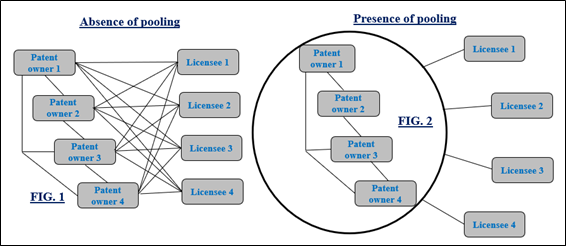Patent pool as a tool to tackle COVID-19 Pandemic

No wonder, innovation steers today’s world. In many instances, several enterprises develop technologies that end up overlapping in various aspects. In scenarios like these, possibilities of one technology to infringe on other technologies is well likely to arise. To address this, patent pools were created. According to WIPO, patent pool is defined as “agreement between multiple patent owners for licensing their patents to one another or any other third party for the purpose of sharing their intellectual property rights.” In the absence of a patent pool (FIG. 1), each of the licensee must negotiate with all the patent owners for obtaining license, which is time consuming and expensive process. Contrastingly, in the presence (FIG. 2), licensees can avail the patent rights as one package from the pool resulting in simplification and cutting down transaction costs.
For a patent pool to work, it requires most key patent holders to be in the pool. As long as members holding the IP positions are participating to ensure that patent pool gains “critical mass” and it is well administered, patent pool will work, otherwise it will fail. The first patent pool was established in mid 1850s and, gained momentum in 2000s when the USPTO encouraged creation of patent pools for biotechnology patents to combat concerns governing biotechnology patents. In the years 2000-2005, discussions on establishing a patent pool began due to SARS outbreak, during which several corporates had filed patent applications on the “genomic sequence” of the virus that was responsible for the outbreak.
Amidst the pandemic COVID-19- Pooling
In 2020, the pandemic COVID-19 has shown benefits of collaborative research in many ways. The TRIPS agreement allows countries to grant compulsory licenses to companies to produce a patented product at times of emergencies. In view of this, the World Health Organization (WHO) and the European Union strongly supported patent pooling, whereas the US and UK were against the patent pooling for pharmaceutical drugs in the 73rd World Health Assembly held virtually on 18-19th May 2020. At the World Health Assembly, Costa Rica suggested pooling of rights to deal with pandemic through free or affordable licensing to ensure the outputs from the efforts could be used by countries with limited economic resources to deal with the issue. This proposal received recognition from all over the globe, except US and UK. Amidst the COVID-19 outbreak, Medicine Patent Pool (MPP) has been actively aiding in removing any IP-related barriers. MPP is a United Nations international organization founded in July 2010, by Unitaid. It is a global health initiative that collaborates with potential partners to make medical innovations to diagnose and treat major diseases in low-and-middle income countries and negotiate agreements with pharmaceutical companies. MPP has been mustering information pertaining to medical patents for COVID-related patents. It seeks voluntary licenses from the patent holders of anti-retroviral drugs to form pooled resource of patented innovations. Through this initiative, pharmaceutical companies and innovators can access the pooled patent rights to develop the new and adapted innovations required for sale in developing countries. The trouble and expense of negotiating licenses where several patent holders might hold rights in a single innovation can be mitigated. Patent holders are benefitted by receiving royalty from various countries and a collaborative platform for easy access to develop the need, as the price of licensing the already patented technology to develop new medicines can be brought down by patent pools.
MPP has created various online databases such as MedsPaL for patents relating to medicines such as remdesivir, tocilizumab and VaxPaL specifically for patents related to COVID-19 vaccines. Another commendable initiative is taken by the WHO, by creation of a voluntary patent pool known as COVID-19 technology access pool (C-TAP), led by Costa Rica and WHO. The goal of C-TAP patent pool is to bundle multiple pieces of IP together to reduce the transaction costs of knowledge sharing on a patent-to-patent basis. MPP is regularly updating its patent intelligence database, MedsPaL, with the status of products during COVID-19 and will continue to update as and when the new patents emerge to find the cure during the COVID-19 pandemic. Currently, Remdesivir, Lopinvir/Ritonavir, Favipiravir, Tocilizumab and Sarilumab have been updated in the database.
Patent pooling: India’s perspective
Patent pooling is recent concept in India. The Indian Patent Act, 1970 neither provides for nor obstruct the creation of patent pools. Nonetheless, one could consider Sections 68, 69 and 102 from Patent Act, 1970 to avail patent pooling with terms and conditions making such relaying legally valid. However, there are issues pertaining to conflicts between the Competition Act, 2002 and Patent Pooling, as the said Act disallows any types of agreements or licenses which have an adverse effect on fair competition in India. With respect to Indian scenario, the Competition Act, 2002 prohibits various IPR licensing agreements that are calculated to be of anti-competitive natured. When such a conundrum arises, Section 140 of the Indian Patent Act defines certain conditions to be considered while getting into a licensing agreement in relation to licensing of a patented article. Hence, it can be contemplated that the Patent Act, 1970 has certain provisions to address the issues coming out of patent pools. The idea of a patent pool particularly may be useful for a generic drug manufacturing major like India. The pool can help with faster production of drugs which are found to be effective for the pandemic. Recently, one Indian generic drug manufacturer Aurobindo Pharma Limited joined the Medicines Patent Pool (MPP) to manufacture several anti-retroviral medicines. This step would facilitate Aurobindo Pharma to have access to the patented drugs of “Gilead Sciences” which was recently introduced into the pool.
Conclusion:
Patent pools can be highly beneficial for facilitating innovation, accelerating the development of a medicine for COVID-19, specially amidst the outbreak. It will be a win-win situation as the patent holders will receive royalties for their innovations, thereby maintaining their income while the low-and middle-income countries would get access to the much-needed medications at affordable prices. For the generic drug manufacturing companies like India, the companies can combine different medications into singe/fixed doses to create better medicines. As in, back in 2014, ViiV Healthcare contributed to MPP by providing dolutegravir, an antiretroviral drug for HIV to its pool resource. It allowed generic drug manufacturing companies to create an affordable version of anti-HIV drug. In India, for the development of commerce, the knowledge regarding the concept of patent pooling should be known to every inventor so as to get good progress in the field of technology or pharmaceuticals. Creation of pandemic patent pool at a global level to pool innovations is good to promote access to medicines and protect public health in large scale.
Please feel free check our services page to find out if we can cater to your requirements. You can also contact us to explore the option of working together.
Best regards – Team InvnTree
This work is licensed under a Creative Commons Attribution-Non Commercial 3.0 Unported License

 Follow
Follow




Leave a Reply